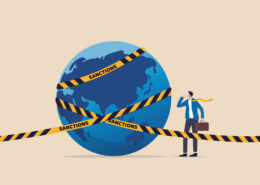Sanctions and Export Controls Update
Monthly Roundup – June 2025
📅 July 1, 2025
📅 July 1, 2025
Welcome to this month’s Sanctions and Export Controls Update, highlighting IFI’s take on key developments from June 2025.
The United States ramped up sanctions targeting Iran’s shadow banking network and defense industry, and identified three Mexican financial institutions as “primary money laundering concerns” –effectively cutting them off from the U.S. financial system. U.S. authorities indicted a New York resident for laundering over $500 million through banks and crypto platforms to acquire sensitive technology for Russian clients, and arrested two individuals for sanctions evasion to supply Venezuela’s state-owned steel industry. Treasury also sanctioned charities funding Hamas and the PFLP and announced a settlement with Unicat Catalyst Technologies for violating Iran and Venezuela sanctions.
The EU extended sanctions over Russia’s annexation of Crimea until 2026 and sanctions related to Russia’s continuing actions destabilizing the situation in Ukraine until January 31, 2026. Meanwhile, the UK The announced the designation of 30 new sanctions targets associated with Russia’s finance, military, and energy sectors, and released an assessment estimating that sanctions have cost Russia at least $450 billion since 2022.
The U.S. Department of the Treasury sanctioned over 30 individuals and entities tied to Iran’s shadow banking network, including the Zarringhalam brothers, for laundering billions through front companies in the UAE and Hong Kong to evade sanctions and fund Iran’s military and terrorist activities. The brothers facilitated payments from Iranian oil and petrochemical sales on behalf of sanctioned entities, including the IRGC-QF and MODAFL, using fictitious invoices and shell companies. Treasury also issued updated guidance to help financial institutions detect Iranian illicit oil smuggling, shadow banking, and weapons procurement activities. This marks the first major action targeting Iran’s shadow banking infrastructure under the administration’s maximum pressure campaign.
Iurii Gugnin, a Russian national residing in New York, has been indicted on 22 counts for allegedly laundering over $500 million through U.S. financial institutions and cryptocurrency exchanges via his companies, Evita Investments and Evita Pay. Prosecutors allege he used these entities to funnel funds from sanctioned Russian banks, disguising the origins and purposes of the transactions while facilitating the purchase of sensitive U.S. technology for Russian clients. Gugnin is accused of deceiving banks and crypto platforms, operating an unlicensed money transmitting business, and failing to implement required anti-money laundering programs. Authorities say he also falsified records and made materially false statements to obtain licenses, using digital tactics to conceal the identities of Russian customers. If convicted, he faces up to 30 years in prison for each bank fraud charge and significant additional penalties for related offenses.
The U.S. Department of the Treasury’s Financial Crimes Enforcement Network (FinCEN) has identified three Mexico-based financial institutions, CIBanco, Intercam, and Vector, as primary money laundering concerns for their role in facilitating opioid trafficking, particularly fentanyl, on behalf of major drug cartels. These are the first actions under new fentanyl-related sanctions and AML laws and include prohibitions on certain fund transfers involving these institutions. FinCEN’s findings detail how these financial institutions helped move millions of dollars on behalf of Mexico-based cartels and facilitate precursor chemical purchases from China. The actions align with broader efforts, including recent cartel designations as terrorist organizations, to combat the opioid crisis and disrupt cartel financing networks.
Juan Carlos Cairo-Padron of Texas and Thomas Michael Fortinberry of Alabama were arrested on June 13, 2025, for allegedly violating U.S. sanctions on Venezuela, smuggling goods, and laundering money. The two men are accused of conspiring to sell millions of dollars’ worth of chemical catalysts and industrial equipment to sanctioned Venezuelan state-owned companies, using front companies and complex financial transactions to hide the true destination of the goods. They allegedly operated through companies they controlled and used suppliers in China to ship goods directly to Venezuela, while moving funds through bank accounts in the U.S., Spain, and China. If convicted, they each face up to 20 years in prison for sanctions and money laundering violations, and up to 10 years for smuggling.
The U.S. Department of the Treasury sanctioned five individuals and five foreign sham charities for secretly funding Hamas’s military wing under the guise of humanitarian aid, with one additional charity linked to the Popular Front for the Liberation of Palestine (PFLP). These entities operated globally from Gaza, Türkiye, and Algeria to the Netherlands and Italy, raising millions of dollars for terrorism while misleading donors. The designations highlight how Hamas and the PFLP exploit nonprofit organizations to finance violence and evade sanctions. Treasury’s action, under Executive Order 13224, aims to protect the charitable sector and prevent further abuse by terrorist groups.
On June 16, OFAC announced a $3.88 million settlement with Unicat Catalyst Technologies, LLC, a company based in Alvin, Texas. The settlement resolves Unicat’s potential civil liability for 13 apparent violations of the Iranian Transactions and Sanctions Regulations (ITSR) and one violation of the Venezuela Sanctions Regulations (VSR). These violations involved the provision of catalyst products and consulting services to Iran, as well as the sale of catalyst products to a sanctioned Venezuelan entity. Although Unicat voluntarily self-disclosed the violations, OFAC determined the case to be egregious, which influenced the settlement amount.
The U.S. Department of the Treasury’s Office of Foreign Assets Control (OFAC) has sanctioned one individual, eight entities, and one vessel, the SHUN KAI XING, for facilitating the shipment of sensitive machinery to Iran’s defense industry. The sanctioned parties were involved in covertly transporting dual-use goods for Iran-based companies linked to the Islamic Revolutionary Guard Corps (IRGC), including Rayan Roshd Afzar Company (RRA) and its affiliates. The shipments involved falsified documents and coordination among companies in China, Hong Kong, Singapore, Türkiye, and Iran. These actions, taken under Executive Order 13382, aim to disrupt Iran’s missile and weapons development efforts. All U.S.-linked assets of the sanctioned parties are now blocked, and engaging with them could lead to further penalties, including secondary sanctions for foreign financial institutions.
The U.S. Justice Department decided not to prosecute private equity firm White Deer Management LLC after the firm voluntarily disclosed U.S. sanctions and export control violations by Texas-based Unicat Catalyst Technologies, which it had acquired. Unicat’s former CEO, Mani Erfan, pleaded guilty to conspiring to violate U.S. sanctions and was fined $1.6 million. White Deer’s timely self-disclosure, cooperation in the investigation, and remedial actions led to a non-prosecution agreement for Unicat, which also paid a total of $8.3 million in penalties. This marks the first time the Justice Department applied its Mergers and Acquisitions Policy to decline prosecution of an acquirer who self-disclosed criminal conduct at an acquired company.
Bence Horvath, 47, a Spanish national residing in the UAE, pleaded guilty in U.S. District Court to conspiring to illegally export U.S.-origin military-grade radio communications technology to Russian end users without the required license. Starting in January 2023, Horvath worked with others to procure the equipment from a U.S. distributor and planned to route the shipment through Latvia to Russia. He purchased 200 radios as part of the scheme, but U.S. Customs intercepted the shipment before it could reach its destination. Sentencing is set for September 30, and the case was investigated by multiple federal agencies, including Homeland Security Investigations and the Department of Commerce.
The EU has decided to extend its sanctions related to the illegal annexation of Crimea and Sevastopol by Russia until June 23, 2026, and its sanctions related to Russia’s continuing actions destabilizing the situation in Ukraine until January 31, 2026. The EU continues to condemn the annexation of Crimea and Sevastopol as a violation of international law and does not recognize Russia’s claim over the territories. The EU reaffirms its strong support for Ukraine’s independence, sovereignty, and territorial integrity within its internationally recognized borders, and remains committed to fully enforcing its non-recognition policy.
The UK announced the designation of 30 new sanctions targets associated with Russia’s finance, military, and energy sectors. The sanctions target 20 oil tankers that are part of Russia’s shadow fleet and the Orion Star Group LLC and Valegro LLC-FZ for their role in crewing and managing shadow fleet vessels. The action also targeted the military agency leading the development of Russia’s underwater intelligence-gathering operations, and two UK residents who operated a network of shell companies to move over $100 million worth of high tech electronics to Russia.
The UK, alongside Australia, Canada, New Zealand, and Norway, has imposed sanctions on Israeli ministers Itamar Ben-Gvir and Bezalel Smotrich for inciting violence against Palestinian civilians in the West Bank. The sanctions target the ministers in their personal capacities due to their roles in encouraging extremist settler violence, which has resulted in over 1,900 attacks since January 2024. The joint action reflects the countries’ commitment to human rights, accountability, and a two-state solution, while urging Israel to halt illegal settlement expansion, uphold international law in Gaza, and stop extremist violence.
On June 13, the UK’s Foreign, Commonwealth & Development Office published an assessment that estimates that international sanctions have deprived the Russian state of at least $450 billion since the start of its invasion of Ukraine in February 2022. This includes $148 billion in lost oil tax revenue due to a widened discount on Russian crude oil, $286 billion in frozen Central Bank reserves, and $12.9 billion in lost interest on those assets. The analysis is considered conservative, as it excludes harder-to-measure impacts like private asset freezes and total export revenue losses and assumes no major changes in oil production or global pricing due to sanctions.










 Canada’s Strong Borders Act
Canada’s Strong Borders ActThis site uses cookies. By continuing to browse the site, you are agreeing to our use of cookies.
Accept settingsHide notification onlySettingsWe may request cookies to be set on your device. We use cookies to let us know when you visit our websites, how you interact with us, to enrich your user experience, and to customize your relationship with our website.
Click on the different category headings to find out more. You can also change some of your preferences. Note that blocking some types of cookies may impact your experience on our websites and the services we are able to offer.
These cookies are strictly necessary to provide you with services available through our website and to use some of its features.
Because these cookies are strictly necessary to deliver the website, refusing them will have impact how our site functions. You always can block or delete cookies by changing your browser settings and force blocking all cookies on this website. But this will always prompt you to accept/refuse cookies when revisiting our site.
We fully respect if you want to refuse cookies but to avoid asking you again and again kindly allow us to store a cookie for that. You are free to opt out any time or opt in for other cookies to get a better experience. If you refuse cookies we will remove all set cookies in our domain.
We provide you with a list of stored cookies on your computer in our domain so you can check what we stored. Due to security reasons we are not able to show or modify cookies from other domains. You can check these in your browser security settings.
These cookies collect information that is used either in aggregate form to help us understand how our website is being used or how effective our marketing campaigns are, or to help us customize our website and application for you in order to enhance your experience.
If you do not want that we track your visit to our site you can disable tracking in your browser here:
We also use different external services like Google Webfonts, Google Maps, and external Video providers. Since these providers may collect personal data like your IP address we allow you to block them here. Please be aware that this might heavily reduce the functionality and appearance of our site. Changes will take effect once you reload the page.
Google Webfont Settings:
Google Map Settings:
Google reCaptcha Settings:
Vimeo and Youtube video embeds:
You can read about our cookies and privacy settings in detail on our Privacy Policy Page.
Privacy Policy